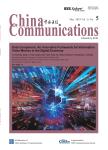A Precise RFID Indoor Localization System with Sensor Network Assistance
A Precise RFID Indoor Localization System with Sensor Network Assistance作者机构:Guangdong Province Key Laboratory of Popular High Performance ComputersCollege of Computer Science and Software EngineeringShenzhen University
出 版 物:《China Communications》 (中国通信(英文版))
年 卷 期:2015年第12卷第4期
页 面:13-22页
核心收录:
学科分类:1305[艺术学-设计学(可授艺术学、工学学位)] 080904[工学-电磁场与微波技术] 0810[工学-信息与通信工程] 13[艺术学] 0809[工学-电子科学与技术(可授工学、理学学位)] 081104[工学-模式识别与智能系统] 08[工学] 0804[工学-仪器科学与技术] 080402[工学-测试计量技术及仪器] 081001[工学-通信与信息系统] 081101[工学-控制理论与控制工程] 0811[工学-控制科学与工程]
基 金:supported in part by China NSFC Grant 61202377 and 61170076 the Guangdong Natural Science Foundation under Grant 2014A030313553 the China National High Technology Research and Development Program 863, under Grant 2015AA015305 Joint Funds of the National Natural Science Foundation of China under Grant U1301252 Guangdong Province Key Laboratory Project under grant 2012A061400024
主 题:radio frequency RFID wirelesssensor networks hybrid support vectorregression
摘 要:Indoor localization is very critical for medical care applications, e.g., the patient localization or tracking inside the building of the hospital. Traditional Radio Frequency Identification(RFID) technologies are very popular in this area since their cost is very low. In such technologies, each tag acts as the transmitter and the Radio Signal Strength Indicator(RSSI) information is measured from the readers. However, RSSI information suffers severely from the multi- path phenomenon. As a result, if in a very large area, the localization accuracy will be affected seriously. In order to solve this problem, we introduce Wireless Sensor Networks(WSNs) with only a few nodes, each of which acts as both transmitter and receiver. In such networks, the change of signal strength(referred as dynamic of RSSI) is leveraged to select a cluster of reference tags as candidates. Then the fi nal target location is estimated by using the RSSI relationships between the target tag and candidate reference tags. Thus, the localization accuracy and scalability are able to be improved. We proposed two algorithms, SA-LANDMARC, and COCKTAIL. Experiments show that the localization accuracy of the two algorithms can reach 0.7m and 0.45 m, respectively. Compared to most traditional Radio Frequency(RF)-based approaches, the localization accuracy is improved at least 50%.



